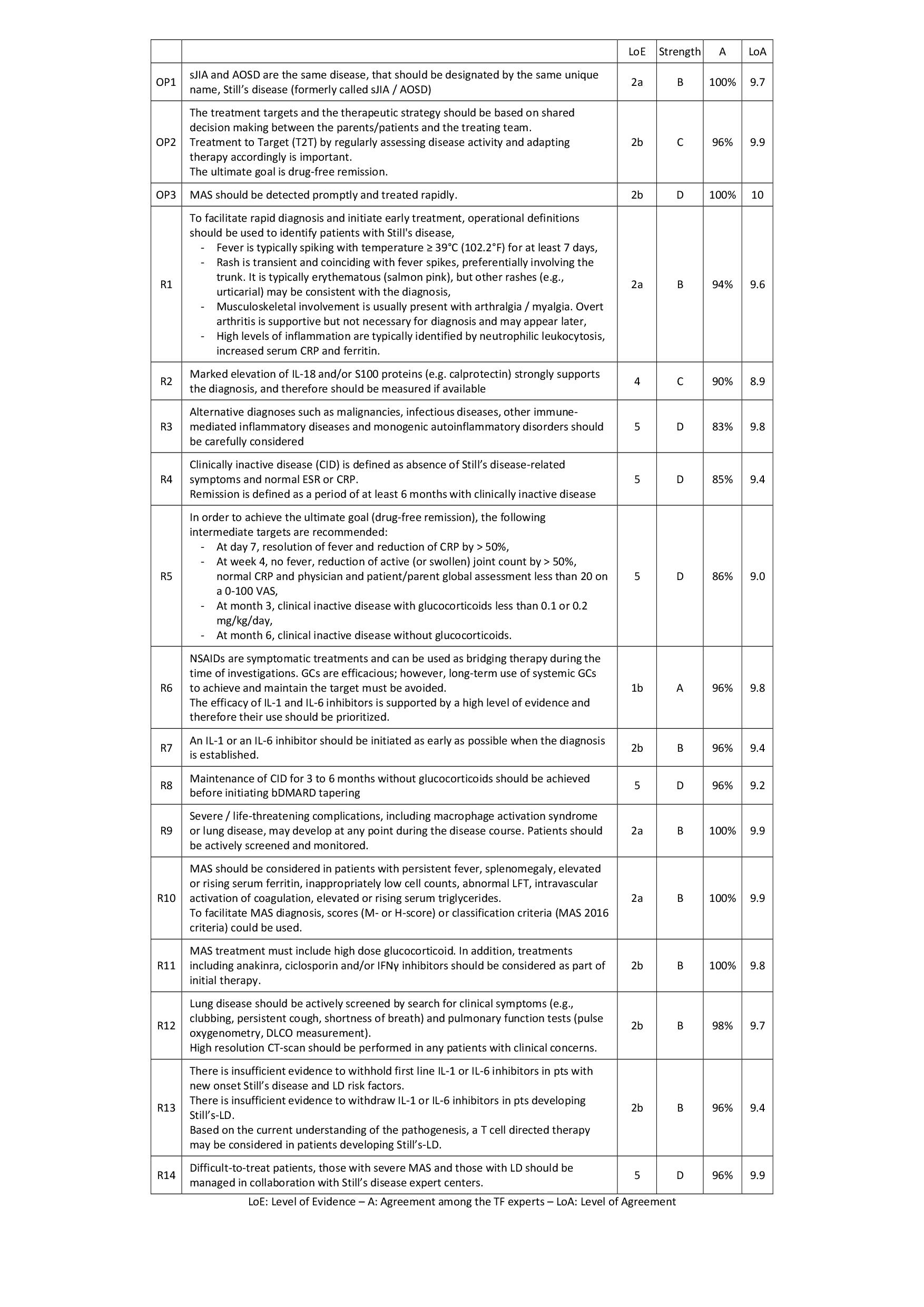Session Information
Session Type: Abstract Session
Session Time: 2:00PM-3:30PM
Background/Purpose: Systemic juvenile idiopathic arthritis (sJIA) and adult-onset Still’s disease (AOSD) are supposed to be age counterparts of the same disease, but no consensus has been reached yet on a common approach to diagnosis and management across ages.
Methods: In May 2022, EULAR (European Alliance of Associations of Rheumatology) and PReS (Pediatric Rheumatology European Society) endorsed a proposal for a joint task force (TF) to develop recommendations for the diagnosis and management of sJIA and AOSD. The TF included 2 convenors (BF, FdB), a methodologist (LC), three fellows (SM, AdM, SB), 25 medical experts and 2 patient research partners (AdB, TW). The TF agreed during a first meeting in September 2022 to cover four main topics: similarity between sJIA and AOSD, novel diagnostic biomarkers, therapeutic targets and strategies, and complications including macrophage activation syndrome (MAS). Four systematic reviews (SRs) were conducted accordingly. Their results were presented to the TF members during a second meeting in March 2023, which enabled the production of overarching principles (OP), recommendations (R) or items for research agenda (RA).
Results: The TF based their recommendation on three OPs (Table): 1) SJIA and AOSD one disease and should be designated by one name, Still’s disease, 2) A treat-to-target approach and a shared decision making should be implemented, with the final goal of reaching drug-free remission, and 3) although several innovative therapies are available, MAS should remain a concern for the physician throughout disease evolution.
Fourteen specific recommendations were issued and are detailed in the Table. Two therapeutic targets were defined: clinically inactive disease (CID) and remission, i.e., CID maintained for at least 6 months. The optimal therapeutic strategy relies on glucocorticoids (GCs) for a maximal duration of 6 months with prioritization of IL-1 or IL-6 inhibitors initiated as early as possible after diagnosis. Life-threatening complications can occur any time during disease course, i.e., at diagnosis, under targeted therapies, and after CID achievement. MAS treatment should rely on high-dose GCs, IL-1 inhibitors, cyclosporin and IFNγ inhibitors. A specific concern rose recently with cases of severe lung disease in children with Still’s disease. The main characteristics are the following: initially mild clinical symptoms including erythematous clubbing, dry cough or shortness of breath; subpleural and septal thickening on CT-scan; interstitial lymphocytic expansion, evidence of T cell activation and features of alveolar proteinosis on biopsy. Risk factors include eosinophilia, increased serum IL-18, history of MAS, exposure to IL-1 or IL-6 inhibitors, and presence of HLA DRB1*15 allele. Adding T-cell directed immunosuppressant seems to be the most appropriate treatment option. Finally, the recommendations emphasized the key role of expert centers, notably those of the RITA European Reference Centers.
Conclusion: These recommendations are the first recommendation for the diagnosis and management of children and adults affected with Still’s disease. All OPs and recommendations were agreed by over 80% of the TF experts with a high level of agreement (9 or more).
To cite this abstract in AMA style:
Fautrel B, MITROVIC S, De Matteis A, Bindoli S, Anton J, Belot A, Bracaglia C, Constantin T, Dagna L, de Bartolo A, Feist E, Foell D, Gattorno M, Georgin-Lavialle S, Giacomelli R, Grom A, Jamilloux Y, Laskari K, Lazar C, Minoia F, Nigrovic P, Oliveira Ramos F, Ozen S, Quartier Dit Maire P, Ruscitti P, Sag E, Savic S, Truchetet M, Vastert S, Wilhelmer T, Wouters C, Carmona L, De Benedetti F. EULAR / PreS Recommendations for the Diagnosis and Management of Systemic Juvenile Idiopathic Arthritis (sJIA) and Adult Onset Still’s Disease (AOSD) [abstract]. Arthritis Rheumatol. 2023; 75 (suppl 9). https://acrabstracts.org/abstract/eular-pres-recommendations-for-the-diagnosis-and-management-of-systemic-juvenile-idiopathic-arthritis-sjia-and-adult-onset-stills-disease-aosd/. Accessed .« Back to ACR Convergence 2023
ACR Meeting Abstracts - https://acrabstracts.org/abstract/eular-pres-recommendations-for-the-diagnosis-and-management-of-systemic-juvenile-idiopathic-arthritis-sjia-and-adult-onset-stills-disease-aosd/

